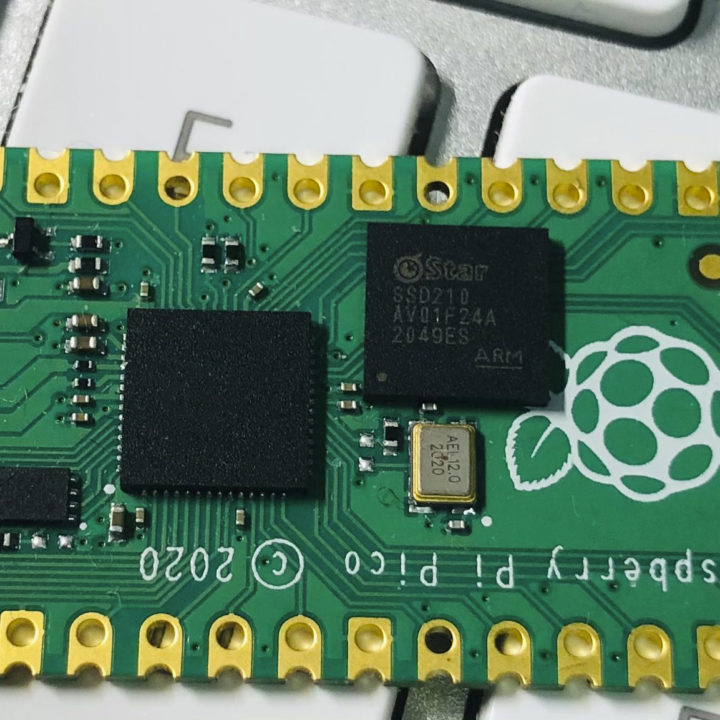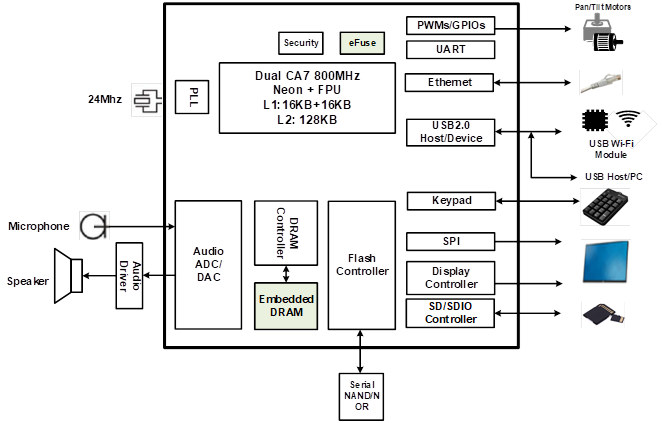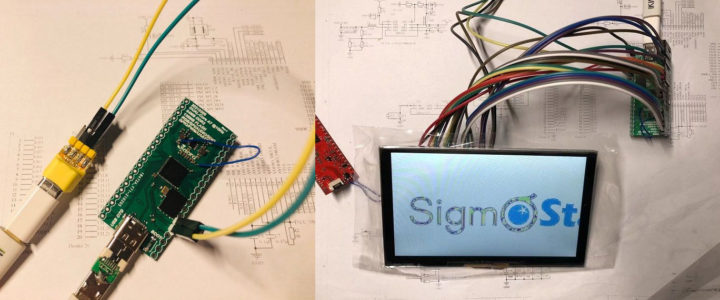SigmaStar offers some of the cheapest Cortex-A7 processors on the market, especially considering they usually integrated 64 or 128MB RAM, which parts like SSD201 or SSD202 which are designed for smart displays, but can also be found in low-cost Linux gateways.
The company’s latest SSD210 processor comes with two Cortex-A7 cores clocked at 1.0 GHz, 64MB RAM, and is offering in a QFN68 package that happens to be the exact same size (7x7mm) as the less powerful Raspberry Pi RP2040 microcontroller.

SigmaStar SSD210 key features and specifications:
- CPU – Dual-core Arm Cortex-A7 at up to 1.0GHz with FPU, NEON, MMU, DMA
- GPU – 2D graphics accelerator
- System Memory – 64MB on-chip DDR2 RAM
- Storage I/F – 1/2/4 bit SPI-NOR/SPI-NAND Flash
- Display – RGB LCD interface supporting RGB565 or RGB666 or RGB888 format up to 60 fps.
- Multimedia – JPEG encoder with support for YUV 422 or YUV420 format
- Networking – 10/100M Ethernet MAC & PHY
- USB – 2x USB2.0 host and device interfaces
- Other I/Os – GPIO, PWM, UART, fast UART with hardware flow control, SPI, I2C
- Security – Secure boot, AES/DES/3DES/RSA/SHA-I/SHA-256, support secure boot
- Misc – 3x general-purpose timers, watchdog
- Voltages
- Input/output voltage – 1.8V~3.3V
- Core voltage – 0.96V
- DRAM voltage – 1.8V
- Temperature Range – -20°C ~ 85°C
- Package – QFN68 (7x7mm)

The new chip is also designed for smart displays using in smart thermostats, HMI display modules, etc… The Linux SDK is still under according to MangoPi & Widora’s Twitter account where I found out about the new processor, including the top photo showing SSD210 is the same size as RP2040.
Speaking of which, the company also decided to create a Linux-capable, Raspberry Pi Pico-sized board based on SigmaStart SSD210. It’s possible to connect an RGB565 display, at the cost of losing access to Ethernet since the interfaces are multiplexed.
You may find more information on Widora forums as hardware and software development progresses. It’s unclear when the board will be available, and at what price at this point in time, but it should probably sell for under $10 once the board comes out.

Jean-Luc started CNX Software in 2010 as a part-time endeavor, before quitting his job as a software engineering manager, and starting to write daily news, and reviews full time later in 2011.
Support CNX Software! Donate via cryptocurrencies, become a Patron on Patreon, or purchase goods on Amazon or Aliexpress. We also use affiliate links in articles to earn commissions if you make a purchase after clicking on those links.






Not 100% sure on this yet but I think this chip is pretty close to the SSD201/SSD202D which means a few good things:
It should overclock really well. The SSD202D can run at 1.8ghz (According to Willy’s mhz tool not just setting the clock frequency).
It should work with the current mstar/sigmastar code which means almost everything except the audio, display and camera interface should work without using the shitty vendor SDK. Full open source booting is pretty close too..
One major advantage of this chip is that it has a USB bootloader so you can write the flash without using the weird mstar tool or flashrom.
Apparently it also has some sort of DMA engine for driving SPI displays. Something like the DMA engine takes the framebuffer contents and drives it into an SPI LCD so you don’t have to waste any cpu time doing it in software.
Wooow
We really need KODI on this 🙂
I’m not sure how this would work. You’d only have 64MB or 128MB RAM to play with, and no hardware video decoder.
As much as I agree, the orignal xbox only has 64MB and that’s where Kodi got started as XBMC.
But, no, no, you don’t want Kodi on this. There are way better choices for a low end Kodi platform.
Yes but the Xbox had hardware decoder and strugled to play a lot of 720p files.
Only with the 128MB mod that was feasible
Is it possible to just to place a video decoder SoC IC to it?
I hardly see how, you don’t have high speed interfaces there (PCI etc).
It would be great if they’d make a board. Plenty of us have long been waiting for tiny Linux boards such as Daniel’s Breadbee. It becomes much easier and cheaper when a device vendor makes them themselves! They arrive at the right moment, benefitting from all the amazing work Daniel has done to support their SoCs in mainline. It would have been much better if they understood this earlier and decided to pass all the datasheets to save precious time wasted guessing how some parts work.
If I can remove last binary blob (The IPL before u-boot) and still get the chips without bankrupting myself (everything has doubled or tripled in price..) I will press the go button on the BB and have them made.
I think widora intends to sell a version of this board too.
m5stack are making something with this family chips too so when maybe when that lands there will be more people poking at it.
dgp, I like what you do, Keep the good work. I hope it pays back one way or another.
Hopefully the sdk is yocto-based, because this seems like a perfect platform to pay around with qt. 64MB ram, dual core and 2d acc is more than enough to handle really cool apps.
Yocto kind of sucks, we need a distro like Alpine/Debian/OpenWRT with packages.
There is an OpenWRT distro from one of the vendors selling boards for the SSD201/SSD202D already:
https://github.com/wireless-tag-com/openwrt-ssd20x
So it’s not impossible. The vendor kernel is a massive POS though so you don’t want that.
It’s way too complicated to build something with Yocto, I agree on that. Even though Yocto itself as concept is quite nice. Wish the scripting would be way more simple. Something more like Docker would be nice.
The SDK is a very messy old kernel, a bunch of binary blobs and some bits from buildroot I think. You really don’t want the vendor SDK if you can avoid it.
Under 10 bucks? Really? That would be quite competivive.
I wish it had at least the 128MB that the Microchip/Atmel ATSAMA5D27C-D1G has. There’s also the -LD2G which has 256MB lpddr2; perfect. One could build a real Linux system on that, even with the single 600MHz Cortex A5 in it. These cpus sound like they’d be faster, much nicer, but 64MB ram is just not enough to make a real Linux system out of this chip.
The SSD202D has 128MB but it also has 128 pins so it needs a slightly bigger board.
From what I can tell they have some 88 QFN chips with 128MB of memory but I haven’t found any in the wild yet.
I see at least two limiting factors:
First, larger capacity memory, in particular on old process nodes, won’t fit into the smallest packages, so they probably hit the limit for the 7mm*7mm one. I couldn’t find actual numbers here though.
Second, they are going for the absolute cheapest products, and when the SoC costs a fraction of a 256MB RAM chip, it gets harder to compete on the price for the SiP.
A third factor may be the memory controller: DDR3 memory is much cheaper than DDR2 or LP-DDR2 at larger capacities, but then you also need a more expensive controller.
I crudely* decapped one of their earlier chips (MSC313E, 8mm x 8mm, 64MB). In that chip the composite of the dies has about 2mm of encapsulation on each side.
My guess would be that in this chip there isn’t a whole lot of room left unless a newer process has made everything a lot smaller. These newer chips only have 64KB of SRAM when the older ones had 128KB.. maybe that makes the die a bit smaller.
That said they have 88 pin chips with 128MB and 256MB of DDR3 apparently.
The memory controller certainly supports DDR3. There is a bigger version of this chip (SSD212 I think) with 128 pins that has 128MB of DDR3 and they’ve been using the same IP for the memory controller in all of the chips so far.
*I couldn’t actually get any die shots because the SoC die and DDR2 seem to be bonded one on top of the other and I had no luck getting them apart.
I’m sorry to tell you that the ssd210/212 can’t get the register manual yet, it’s just a black box.
You have an interesting website. Showing all the latest processors chips available which are competitive and low cost. I search on google, Alibaba and also Aliexpress for “SigmaStar Cortex-A7 SoC IC” and can not find anyone selling discrete SoC IC parts for it.
Where can I buy just the SoC IC for SigmaStar Cortex-A7 SoC ICs, do anyone sell like 5-20pcs?
Thanks.